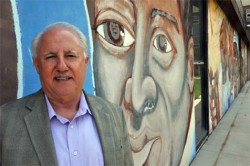By: Ashmar Mandou
 If the name Greg Galluzzo doesn’t ring a bell with you, it’s no surprise to the advocate himself. He actually prefers it that way.
If the name Greg Galluzzo doesn’t ring a bell with you, it’s no surprise to the advocate himself. He actually prefers it that way.
“I’m not in the business of being at the forefront and making it a point to say I founded such organizations,” said Galluzzo. “I am more interested in being the catalyst for others to take the lead to spur justice.”
Growing up in an era when America was at a heightened state of change, Galluzzo, now 70, learned the importance of mobilizing a community to rectify injustices.
“The ‘60s served as a prime opportunity to take part in several movements,” said Greg Galluzzo. “We had the civil rights movement, the anti-war movement, the women’s rights movement, the environmental movement. It was a time when we observed inequality and people took it upon them to spark change in the system.”
These movements served as a training ground for Galluzzo to ultimately decide to devote his life to developing leaders across the globe. At the tender age of 18, Galluzzo studied to become a Jesuit Priest and with that role traveled to South Africa and the United Kingdom to assist families who had been neglected or displaced by their government. “I learned a lot during my years traveling to those countries and all that experience led me to come to Chicago at a time when leaders were needed.”
In 1972, Galluzzo came to Chicago and hit the ground running. In a time when there was a huge influx of immigrants facing discrimination, Galluzzo rolled up his sleeves to muster community residents to combat social injustices to help bring resources to underserved families across the South side of Chicago.
“It was shocking to come in to a community and see that these people did not have the basic needs,” said Galluzzo. “No clinics, no schools, there wasn’t a set schedule for garbage pickup. Residents in wealthier neighborhoods were getting garbage pickup twice a week, and south side residents were lucky if the city would come around once every two weeks. So we knew we had to fight for this basic human right. So once we rallied enough residents, we took our garbage and dropped it off in front of the alderman’s office. It was a defining moment that really empowered people,” said Galluzzo.
In addition to that, Galluzzo helped the Mexican-American community by opening the first elementary school called Los Ninos Heroes which was dedicated to the memory of the Heroic cadets who died defending Mexico City’s Chapultepec Castle from invading U.S. forces during the Mexican-American War.
Later, Galluzzo worked to organize and rally the people in Pilsen to open Benito Juarez High School as well as turn park district property back ‘to the people.’ The site in which community members fought for is now home of the largest Mexican museum in the country, called the National Museum of Mexican Art. The following year, Galluzzo worked tirelessly to build the first health clinic in South Chicago, which still stands today at 106th and Torrence.
But three of his most notable achievements include the founding of the United Neighborhood Organization (UNO), Gamaliel, a Chicago based organization rooted in grassroots efforts, and Fiesta del Sol, which he co-founded with his wife Mary. He has worked in shaping the lives a young Barack Obama and Daniel Solis when Galluzzo served as their mentor.
Though many rejoice over his accolades and laundry list of accomplishments, nothing brings greater joy to Galluzzo than witnessing the transformation of people from passive to active. “In all my years of activism and shaping leaders, I was lucky to be the beneficiary of the many gifts people have given to me.”
Much like Greg Galluzzo and his efforts to help underserved families across the South side of Chicago, ComEd is dedicated to helping its customers in financial hardships. That’s why, through the ComEd CARE programs, we offer a range of financial assistance programs to help qualified customers with paying their electric bills, and we support energy-assistance programs that help those in need.









